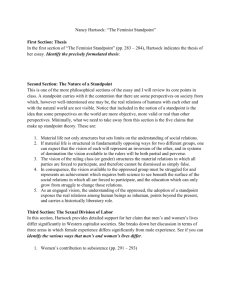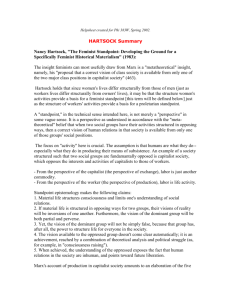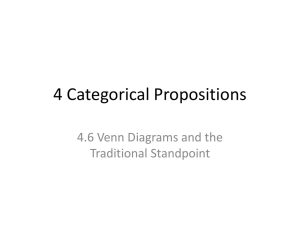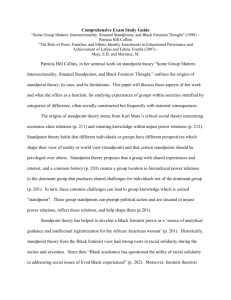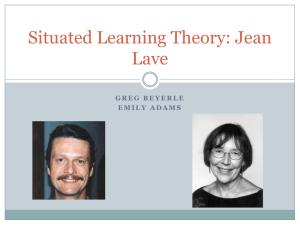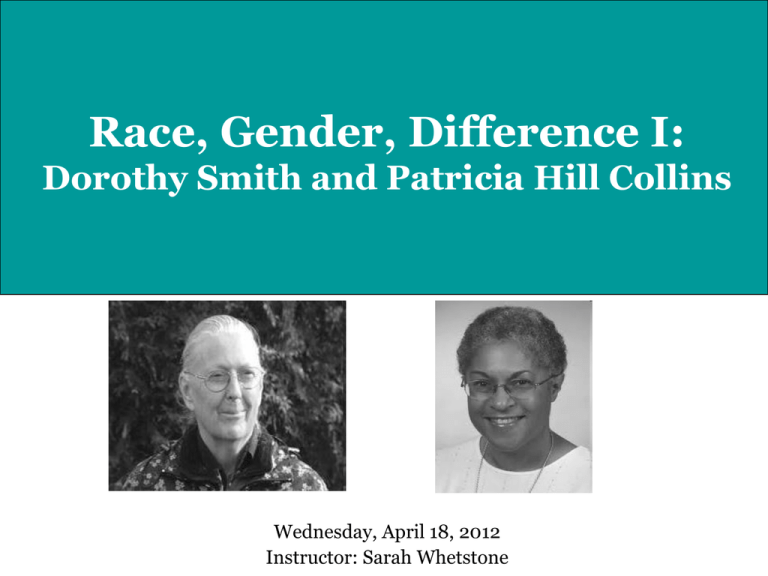
Race, Gender, Difference I:
Dorothy Smith and Patricia Hill Collins
Wednesday, April 18, 2012
Instructor: Sarah Whetstone
Confronting “Difference” in Sociology
• Roots: anti-colonial revolutions, civil rights
struggles, women’s movements and development
of feminism, gay rights movements
• Social categories were publicly tied to shared
identities, experiences, or struggles
• Shared identities became bases of claims for
political and social recognition
• Sociologists began to theorize difference in new
ways
Objectives for Theorizing Difference
1)
2)
Correct false generalizations implied in classical sociological theories
and establish the limits of existing theory. Bring categories of
difference back in!
Question whether social categories (gender, race) really have
objective, stable meanings. Ask how these categories are historically
produced and applied, and how they naturalize human difference.
1)
2)
3)
Biological theories of race are unsound--- race is an historical invention
Sex vs. gender– Biology is implicated in reproductive difference, but
gender is a social construct
Ask how gender and race have structured society itself.
1)
Essentializing women as emotional, men as rational contributed to the
division of public and private spheres, and to our understanding of how
the state functions
Debates in Theorizing Difference
• Essentialism vs. Constructionism
– Does identity exist first as a “real” category, or did
identity-based movements and other social processes
create identity categories?
– Gender, race, and other identities are social
constructs, but they are also powerful and shape our
lives whether or not we choose them ourselves.
• Positivist objectivism vs. Subjective knowledge
– Is it possible to hold the “view from nowhere?”
– Many sociologists argue that all knowledge is
situated– it comes from some particular perspective
that shapes the production and meaning of the
knowledge itself
Epistemology
• From the Greek words episteme (knowledge) and
logos (word/speech)
• The branch of philosophy that deals with the nature,
origin and scope of knowledge, truth and belief.
• Concerns the justification of knowledge claims: How
can we know what we know?
• Epistemological positions: empiricism, positivism,
pragmatism, Black feminist thought, etc.
• Fundamentally a political question: What counts as
truth, by what criteria, and who gets to determine it?
Dorothy Smith: “The Conceptual
Practices of Power”
•Canadian sociologist, born in 1926 in England
•Studied social health and survey methods, gender
•Best known for pioneering “feminist standpoint
theory”
Main Concepts:
•Everyday world as problematic– a thing to be
explained
•Critiques the objectivism of positive social
science as a male-centric endeavor
•Situated knowledges
•Bifurcated consciousness
•Standpoint theory
Dorothy Smith: Discuss
Groups 1-5:
•
What are the “two difficulties” Smith describes at the beginning of the
piece?
•
What is the role of sociology in governing, and how does this shape the
content and practice of sociology?
•
Smith argues that women are excluded from the “governing conceptual
mode.” What does she mean by this, and how does it happen? Give
specific examples.
•
What is the concept of “bifurcated consciousness?” How is the concept
similar to Marxist notions of “alienation?”
Groups 6-10:
•
What does Smith mean by “situated knowledge,” and how does
this concept constitute a critique of objective science?
•
Explain Smith’s concept of “standpoint theory.” How does this
offer a potential solution to the problems identified?
•
What does Smith argue we must do after we start theory from
situated knowledge? (324-325)
Exclusion of women from the
“governing conceptual mode…”
• All knowledge begins with concrete,
sensory experience
• Elite men get to pass “beyond the local,”
and transcend their bodies, into the
conceptual order
• Women and other dominated groups are
confined to menial tasks, and remain fixed
in local, practical knowledge
Situated knowledge, Standpoint
theory, Critique of sociology…
• Current sociology creates abstractions which are useful
for governing, but objectivity is an illusion produced by
the artificial separation of knowledge from realm of local
• Instead, we need situated knowledge– which starts and
ends with local, practical experience
• Standpoint theory– offers a way for women to produce
knowledge rooted in experience of everyday world
• Abstractions must be rooted in situated knowledge–
practical and local– to be correctly informed
• But, abstraction is still necessary because the local is
shaped by conditions beyond our comprehension and
control
Patricia Hill Collins: “Black
Feminist Epistemology”
• Born 1948 as a factory worker’s
daughter, became president of
the ASA
• Began career as a schoolteacher–
concerned with critical theories
of education and knowledge
production
Main Concepts:
• Draws on Smith’s standpoint
theory, but highlights the unique •Critique of standpoint theory
•Development of Intersectionality
experiences of Black women in
•Black feminist epistemology
the US
Patricia Hill Collins: Discuss
Groups 1-5:
• Describe Collins’ basic critique of positive science.
• What are the “dominant knowledge validation processes?”
Give examples of how knowledge is usually coded as
“legitimate.”
• What is “subjugated knowledge?” How is Black women’s
knowledge subjugated? What dilemmas do Black women face
even after they attain positions of authority in academia?
Groups 6-10:
• How does Hill Collins both build on and critique Smith’s
concept of standpoint theory?
• What responses have Black feminist scholars made to the
positivist dilemma?
• According to Collins, what are the most important
contributions of Black feminist thought within and outside its
own constituency?
Dominant knowledge validation process, or
how knowledge gets created
Elite “gatekeeping
institutions legitimize
knowledge and grant
credentials
Truth claim
“Science”
Positivist standards:
Distancing of subject from object
Absence of emotions
Absence of political or ethical agenda
Advance through adversarial debate
Dominant knowledge validation process, or
how knowledge gets created
Elite “gatekeeping
institutions legitimize
knowledge and grant
credentials
“Science”
Truth claim
Black Feminist Thought:
Historically blocked from
literacy, credentials, and
academic power
Black women “make it,” but
now face new problems:
Tokenism
Incompatibility of BFT with
other epistemologies, esp.
positivism
Subjugated knowledges
• All social groups have their own kinds of
knowledge– own map of how world works–
including unique insights produced from the
social conditions in which they live
• But the knowledges of groups excluded from
education and the dominant public sphere is
submerged or subjugated– covered up and
buried, not acknowledged.
• This makes it harder to investigate– so we must
move outside formal expertise and listen to
voices in marginal spaces.
Intersectionality
• Cross-cutting forms of
oppression (Kimberle
Crenshaw)
• We cannot understand the
standpoint of a person by
looking at only one form of
oppression (critique of
Smith’s standpoint theory)
• Forms of oppression which
structure society intersect to
shape each other and to
shape experience
• Eg- Gender hierarchies
shape the nature of racial
discrimination, and vice
versa
gender
race
class
nation
sexuality
age


